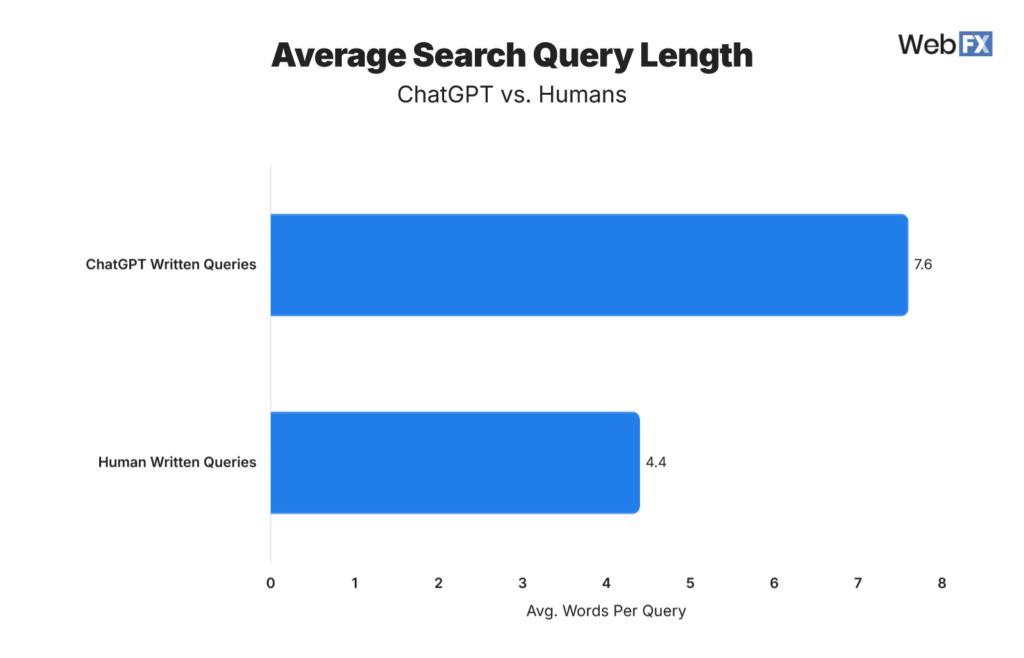-
 Published: Jun 30, 2025
Published: Jun 30, 2025
-
 4 min. read
4 min. read
-
Summarize in ChatGPT
-
 Trevin Shirey
Trevin Shirey VP of Marketing
VP of Marketing
- Trevin serves as the VP of Marketing at WebFX. He has worked on over 450 marketing campaigns and has been building websites for over 25 years. His work has been featured by Search Engine Land, USA Today, Fast Company and Inc. Read his review of working with WebFX for the last 15 years.
A data-driven look at 4,600+ chats, and what today’s marketers must do to stay visible.
AI-powered search is reshaping how people find information, but ChatGPT hasn’t completely abandoned traditional search engines. To understand when and why LLMs still turn to external sources, I analyzed several months of ChatGPT conversations, extracting every Bing search query the model initiated during its reasoning process. Hat tip to Ziggy Shtrosberg for his handy bookmarklet.
You can also export all of your conversations within ChatGPT and analyze the provided conversations JSON file that contains any search query data from your past chats. (If you get stuck, just ask ChatGPT…meta prompting!)
My working dataset spanned 4,696 responses covering diverse topics, from gardening advice to airfare research to gift recommendations, revealing consistent patterns in how LLMs decide between internal knowledge and external search. What emerged are five critical trends that will reshape marketing strategy in the AI-first era.
1. ChatGPT writes longer queries than humans do

The data revealed a stark contrast in query construction. ChatGPT’s searches averaged 7.66 words, with 87% extending beyond five words, nearly double the 4.4-word average of human searches. These aren’t keyword strings; they’re natural language questions that specify exactly what information the model needs.
Real examples:
- “2025 Hyundai Tucson Hybrid SEL Convenience TrueCar Nebraska”
- “Should I mow grass during heat wave lawn care extension advice”
This precision matters. Longer queries help search engines understand context: is the user interested in fuel economy, MSRP, or seasonal lawn care stress? The specificity leads to more targeted results.
Marketing Takeaway 👇🏻
The long tail remains valuable, but it’s evolving. Stop optimizing solely for two-word head terms. Your content architecture (especially H2 headers and FAQ sections) should mirror full-sentence queries. Think “How much does heat-tolerant fescue lawn cost to reseed?” instead of “fescue reseed cost.”
2. Freshness triggers search: Dates and dollars dominated
ChatGPT rarely consults external sources for general knowledge, but specific, time-sensitive information is different. I observed the model explicitly noting in its reasoning that while it believed it knew an answer, it wanted to validate current accuracy.
The numbers tell the story:
| Query Type | Share of Total Queries |
| Contains specific year (2024/2025) | 58.5% |
| Uses explicit price vocabulary | 17.9% |
Real examples:
- “Delta PHL to Cancun Oct 25 price drop”
- “NBA playoffs teams June 2025 date”
Both illustrate the same principle: when answers are time-bound, LLMs defer to real-time search.
Marketing Takeaway 👇🏻
Structured data freshness is critical. Keep price tables, release timelines, and event schedules meticulously current and crawlable. Stale information means AI systems will source from competitors with updated data. There’s significant opportunity to become a primary data source for LLMs—if your information is authoritative and current.
3. Brand preferences drive query construction
Without user prompting, ChatGPT consistently appended trusted sources to specific query types:
- TrueCar appeared in dozens of car-pricing searches
- Amazon dominated product pricing queries
- Reddit was the go-to for sentiment and user feedback
44.3% of all ChatGPT-generated queries contained a brand name. The model doesn’t ask “how much is a tee ball set”—it constructs “tee ball set price 2025 amazon” to target a specific, trusted source. This is of course influenced by the type of chat you are having with an LLM. If you are asking for Delta flight information or Starbucks information, the brand will get inserted into the search query.
Nevertheless, ChatGPT has a strong preference for relying on certain platforms online like Amazon and Reddit when hunting down specific nuggets of information.
Marketing Takeaway 👇🏻
Third-party visibility has never been more important. The narrative LLMs construct about your brand may derive entirely from platforms like Reddit, Amazon, or industry-specific sites. Your reputation management strategy must extend beyond owned media.
4. Model sophistication reduces search dependency
Overall, bigger and better models are much less likely to rely on Bing for help giving a proper chat response. Here’s what my dataset showed:
| Model | % of Replies that Used Bing |
| o4-mini | 14% |
| o3 | 8% |
| o1 family (early 2023 models) | 3% |
| GPT-4o | 1% |
(Sidenote: OpenAI has got to do something about these model naming conventions, am I right?)
Recent industry observations align with my findings. At Cannes Lions 2025, Cloudflare CEO Matthew Prince noted that sophisticated LLM models are driving less web traffic than their predecessors: they’re reading the web more than users are visiting it.
This evolution suggests that as LLMs become more capable, they’ll increasingly synthesize information internally rather than directing users to external sources.
The marketing playbook for an AI-first future
These patterns reveal a fundamental shift in how information flows from content creators to consumers. Success requires adapting to how AI systems discover, evaluate, and synthesize information:
- Content architecture: Structure content around natural language queries and specific user intents
- Data freshness: Maintain scrupulously current structured data across all touchpoints
- Third-party presence: Actively manage your brand narrative across platforms where AI systems source information
- Brand consistency: Ensure consistent naming and schema markup to improve AI disambiguation
- Authoritative sourcing: Position your content as the definitive source for your domain expertise
As search continues evolving, marketing strategies must evolve alongside it. The brands that thrive will be those that understand not just how humans search, but how AI systems discover and prioritize information.
Ready to adapt your marketing strategy for the AI-first future? Our OmniSEO offering helps brands optimize for both human and AI discovery, ensuring visibility across traditional search and emerging AI platforms. As search behavior evolves, your marketing playbook needs to evolve too.
-
 Trevin serves as the VP of Marketing at WebFX. He has worked on over 450 marketing campaigns and has been building websites for over 25 years. His work has been featured by Search Engine Land, USA Today, Fast Company and Inc. Read his review of working with WebFX for the last 15 years.
Trevin serves as the VP of Marketing at WebFX. He has worked on over 450 marketing campaigns and has been building websites for over 25 years. His work has been featured by Search Engine Land, USA Today, Fast Company and Inc. Read his review of working with WebFX for the last 15 years. -

WebFX is a full-service marketing agency with 1,100+ client reviews and a 4.9-star rating on Clutch! Find out how our expert team and revenue-accelerating tech can drive results for you! Learn more
Try our free Marketing Calculator
Craft a tailored online marketing strategy! Utilize our free Internet marketing calculator for a custom plan based on your location, reach, timeframe, and budget.
Plan Your Marketing Budget

SEO Success with KOA

Proven Marketing Strategies
Try our free Marketing Calculator
Craft a tailored online marketing strategy! Utilize our free Internet marketing calculator for a custom plan based on your location, reach, timeframe, and budget.
Plan Your Marketing Budget
What to read next




